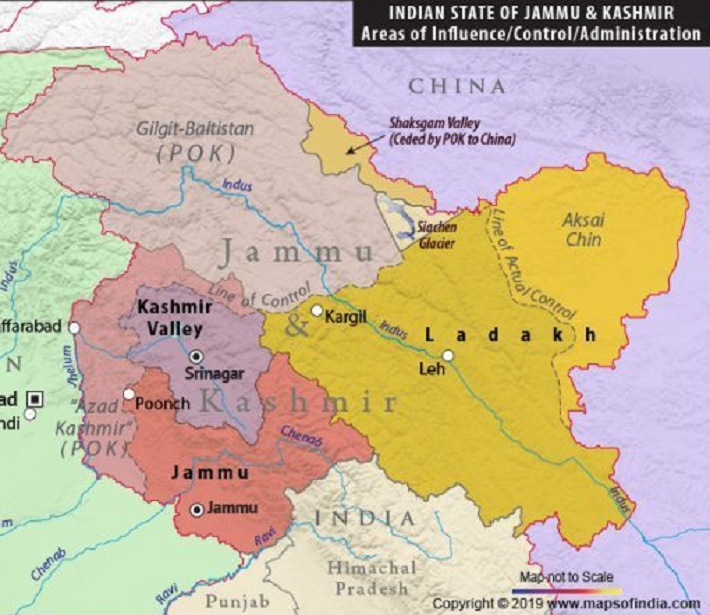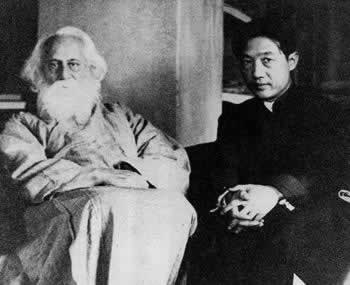Dr. Hemant Adlakha, Honorary Fellow, Institute of Chinese Studies; Associate Professor, Centre for Chinese & South East Asian Studies, Jawaharlal Nehru University

Scholars in the P R China have reacted quickly and sharply to the Indian government’s sudden decision to remove Kashmir’s special status under Article 370 and reorganize the state into two centrally governed territories – Jammu and Kashmir being one, Ladakh the other. In the views of most Chinese experts, India’s ‘unilateral’ move is not only ‘irresponsible and is source of tension in one of the most complex border disputes in the region’ but it (the Indian move on Kashmir) has the potential to ‘seriously derail’ the recent consensus arrived at between the president Xi Jinping and prime minister Narendra Modi.
Echoing Beijing’s official position on the status of the state of Jammu & Kashmir, the scholarly commentaries too describe the Kashmir region as internationally acknowledged disputed area between India and Pakistan; as also established in the 13 August, 1948 UNSC Resolution, 5 January, 1949 UN Resolution on India Pakistan Commission, and 1972 Simla Agreement etc. respectively.
Interestingly, in sharp contrast with the section of the Indian English language national media – both the print and electronic – reports last Tuesday that “India and China (on Monday) seemed to have stepped back from allowing Kashmir to become an unmanageable irritant between the two countries,” just as the visiting Indian foreign minister, Mr. S. Jaishankar was holding talks with his counterpart in Beijing, op-ed columns in the mainstream Chinese media were screaming out with contradictory tones. Take a look at the sample: “As India scraps Kashmir’s special status, Pakistan’s dream lies shattered,” “India Revoking Kashmir Special Status is Violation of China’s Sovereignty: Don’t Expect Beijing to sit by idly,” “China will Never Let India’s Kashmir Power Grab Succeed.”
In addition, even as the Indian EAM was shaking hands with the Chinese vice president, Wang Qishan, a researcher at the Shanghai Institute of International Studies, SIIS, Mr. Liu Zongyi wrote in a signed syndicated column, “Due to India’s classification of Ladakh as a centrally administered area, the territory of the region, which was occupied by India in the western sector of the Sino-Indian border, will also have an impact on the stability of Sino-Indian relations.” Mr. Liu Zongyi also dons the position of a visiting research fellow at the Renmin University of China’s Chongyang Institute, an influential Beijing think tank on foreign affairs issues.
In another signed article on the same day, a Chinese scholar argued that India’s arrogant action has posed an increased security risk to the LAC in the western sector along the boundary between China and India. “China immediately and firmly opposed (India’s Kashmir move) not only because the Indian arrogant action will exacerbate regional tensions and pose a threat to China’s peripheral security, but also because the Indian action will render the LAC along the western sector of the boundary between the two countries increasingly vulnerable.” In the wild Indian imagination, the composition of the so-called Kashmir region includes the IOK – which includes Jammu, the Kashmir Valley, Baltistan and the China’s native land of Ladakh; the POK, the Chinese Aksai Chin as well as the Demchok region to the west of Aksai Chin – currently under dispute, the article claimed.
Several Chinese commentaries view the controversial unilateral Indian push to change Kashmir’s status is aimed at fulfilling Modi government’s Hindu nationalist agenda. According to Liu Zongyi, “the Bhartiya Janta Party and its parent organization the Rashtriya Swayamsevak Sangh have always believed India has been at the forefront of resisting the Muslim invasion for 1300 years. The revocation of the Kashmir special status is the successful accomplishment of the BJP/RSS political agenda, i e, to strengthen Indian control over Kashmir, to alter Kashmir’s demographic nature, and to fully integrate it into the Union of India.”
The article, which first appeared on the Chongyang Institute website on August 12 and was quickly picked up by various Chinese news portals claims, the Kashmir move had been hatched based on a well-synchronized strategy, with keeping in mind both national as well as international factors. Speaking of the internal factors, the article contends that the Modi government wanted to fulfil its election promises to integrate Kashmir with India, which it had failed to implement during the previous five years on account of lack of majority in the Indian parliament. Likewise, several other Chinese commentators too have interpreted the parliamentary move on 5 August as an attempt by Modi, emboldened by the recent election victory, to have greater control over Kashmir, India’s only Muslim-majority state and the main source of conflict between India and Pakistan.
On the other hand, the external factor which largely contributed to the timing of the Kashmir move was the rapid progress achieved by the US and Taliban recently. Leaving India not only marginalized and isolated in the renewed Afghan peace process but also pushing India face the risk of losing initiative on both Afghanistan and Kashmir vis-à-vis Pakistan. Besides, Chinese commentators over time have been highlighting India desperately trying to win over the US support to isolate Pakistan/Taliban in order to strengthen control over the entire Kashmir region. It is in this context these experts see a close link behind the Indian unilateral action in Kashmir to two more possible external reasons: to alert as well as draw the US attention to the fact that India alone has the right to determine what goes on in Jammu & Kashmir; and that India will not tolerate Pakistan to make use of the Taliban militants to unleash terrorism in Kashmir.
Furthermore, typically least surprising, not one Chinese commentary so far has voiced concerns such as total clampdown on democracy in Kashmir, closing down of schools, tourists evacuation, cutting off internet connectivity, and putting some of the local political leaders under house arrest etc.; on the other hand, what is also noticeably absent in the Chinese commentaries are the worldwide heightened concerns of both India and Pakistan being the nuclear weapon possessing neighbours. Neither China’s leaders nor the experts/scholars have indicated worrying signs that any escalation might push the two South Asian hostile neighbours ‘over the edge’ and start a conventional war that might well grow into a full-on nuclear conflict.
Finally, as already mentioned, the Chinese concerns are largely centred on how Pakistan is going to equip itself both diplomatically and otherwise to successfully thwart off the arrogant Indian move in Kashmir; whether the immediate counter measures the Imran Khan government has announced would exercise any impact on India – measures such as to downgrade diplomatic relations, to cut off economic and trade ties, to put a ban on the Indian movies, to deny air space access over Pakistan to the Indian air flights and so on. A few Chinese scholars did however warn India of serious consequences of carrying out ‘aggression’ over the Chinese sovereign areas in the so-called Union Territory of Ladakh. Likening India’s highly contentious move in Kashmir to the behaviour of a rogue state, one commentator questioned: India has been dreaming of becoming a UNSC permanent member, does India aim to achieve this by deliberately violating the UNSC Resolutions and by trampling on the authority of the UN and the Security Council?
